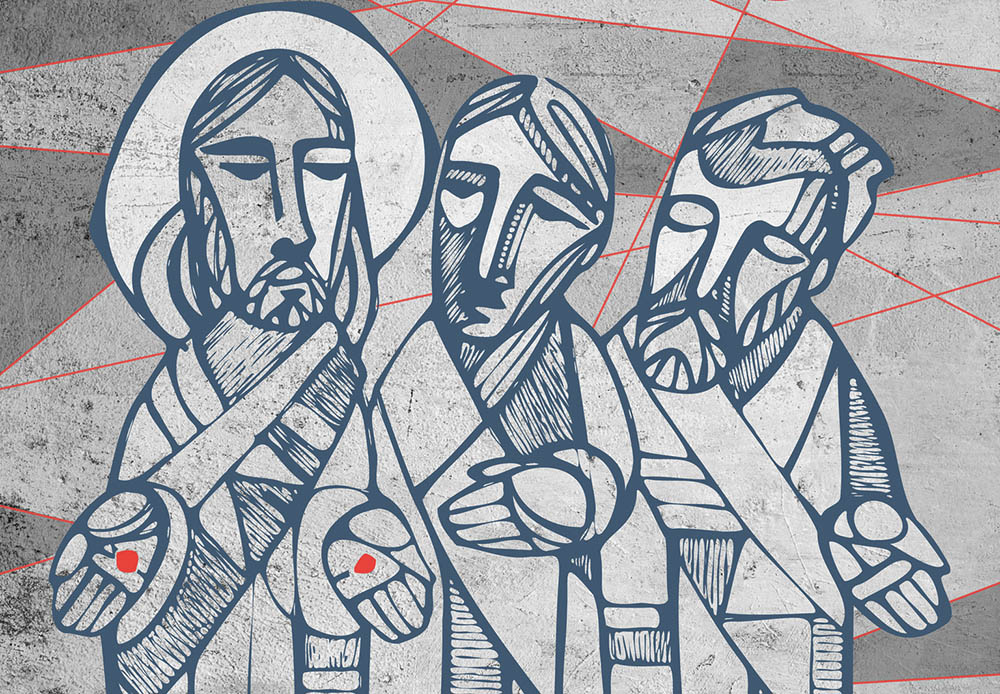
(Dreamstime/Bernardo Ramonfaur)
As it starts out, today's Gospel seems redundant, repeating last week's scene in which Jesus appeared among the disciples. But there are some key differences.
First of all, today's event took place while the disciples from Emmaus were explaining how Jesus had been with them on the road and at table. Secondly, Luke says nothing about locked doors. Finally, and most significantly, the disciples were disturbed by Jesus' presence, not the danger posed by their adversaries.
Disturbance, astonishment and fear are normal responses to an encounter with God or angels. (See Luke 1:12 and 1:29-30.) If a sunset can be literally breathtaking and the miracle of a newborn's life can move you to soul-shaking awe, how much more an encounter with God? Anyone with good sense would be overwhelmed at such an appearance. If not, or if the one appearing does not say, "Do not be afraid," the visitor is probably not a heavenly being.
Jesus asks the disciples, "Why are you troubled? Why do questions arise in your hearts?" Doesn't that sound like the most naive question in the world?
Then Jesus went on to explain that his earthly end recapped all that he had lived among them. He had told them that evil would unleash all its power in the attempt to eliminate him. But when it did, they apparently concluded that their years with him had been a beautiful, challenging, but impossible dream. That was their state when he stood among them.
Not only did Jesus show them the scars of his confrontation with evil, he assured them that he was real. They couldn't grasp that until he "opened their minds to understand the Scriptures."
Like all of us, the disciples had their own ideas about God's power and the role of a savior. Although their time with Jesus had been wonderful, they had succeeded spectacularly at evading his scandalous teachings about a savior in solidarity with all who suffer and a God who does not intervene in history by direct divine power.
How many times had Jesus talked about being great by serving as the lowliest? They failed to grasp the fact that he was not just talking about what he was doing at the moment, but about the very character of God, who invites but never compels us to anything.
Awed and joyful as they were at Jesus' appearance, it still took them a long time to realize that if they were to be his, they would share in his own vulnerability. His hands and his feet told part of the story. His wounds put the wrath of evil on display, at the same time proclaiming that no evil, no suffering, no war or disaster can overpower the goodness of God.
This truth also told them that nothing they could ever do or say or think could stop God's love for them. As we see in today's first reading, Peter eventually came to understand that. Thus, he could reproach the people who had supported or been unconcerned about Jesus' crucifixion: "You denied the Holy and Righteous one, preferring a gangster. The author of life you put to death — not imagining that God would vindicate him by raising him up from the dead."
Advertisement
Peter followed that by saying, "I know you and your leaders acted out of ignorance."
Now that was a miracle! Peter accepted the fact that Jesus had mercy on his persecutors, saying that they knew not what they were doing (Luke 23:34). Peter had come around, finally understanding that the Messiah would suffer.
Peter also realized that God can transform suffering, sin, brokenness and blindness into new experiences of grace if only we open ourselves to the Spirit.
What does this tell us today as we see an overabundance of revenge acted out in Gaza and the ferocity of death-dealing evil in Ukraine and other countries like the Democratic Republic of Congo, Mozambique, India and Syria — to name only a few of far too many?
Jesus told his disciples to be converted — that is, to assume a new vision of life. He wanted them to believe exactly what his cross revealed: The powers of oppression, hatred and clinging to dominating power will fail — not only in the end, but every time an innocent person stands up to them. That is why Jesus and his followers are so dangerous to the "great powers."
By appearing, Jesus invited the disciples to move beyond fear and incredulity and to begin to act on the belief that the only lasting power is love — and that such love disturbs the violent more than any weapon ever can.
Faith in the Resurrection calls us into a bold new way of loving, knowing that with God's help such a love can never be conquered.
